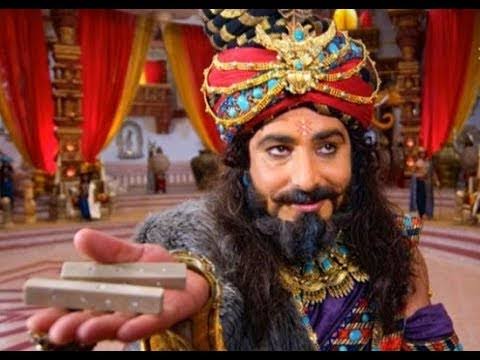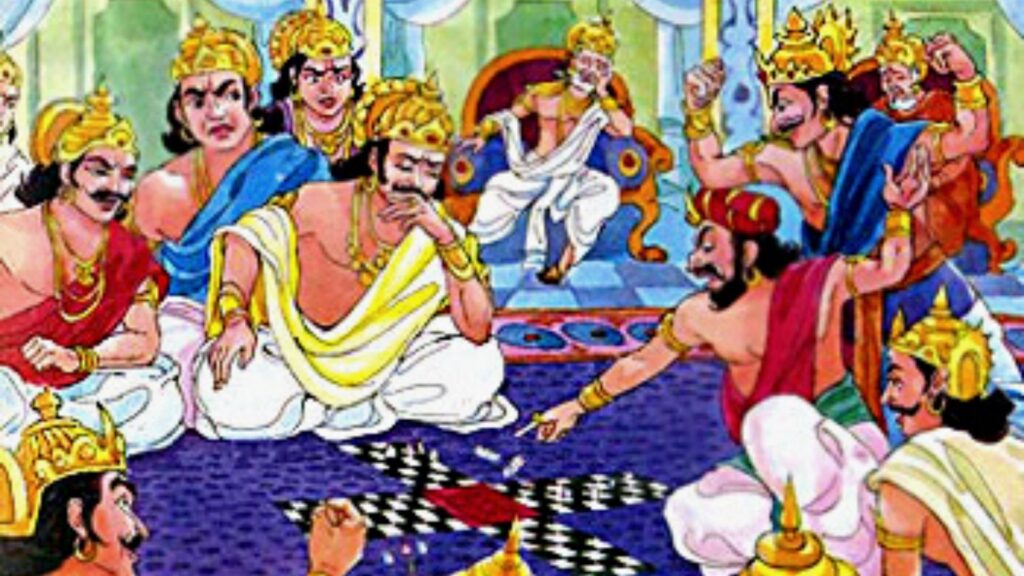Introduction
The Mahabharata, an epic that embodies the eternal battle between dharma (righteousness) and adharma (unrighteousness), introduces us to some of the most intricate and compelling characters. Among them, Shakuni stands out as a master strategist, a cunning manipulator, and a figure whose actions altered the course of history. But was Shakuni merely a villain, or was he a man driven by deep-seated vengeance and a complex destiny? In this blog, we will explore the life of Shakuni, his role in the Mahabharata, and the spiritual lessons hidden in his story.
Who was Shakuni?
Shakuni was the prince of Gandhara (modern-day Afghanistan) and the brother of Gandhari, the wife of Dhritarashtra. He was known for his sharp intellect, strategic thinking, and mastery in the game of dice. As the maternal uncle of the Kauravas, Shakuni played a crucial role in shaping their fate, particularly that of Duryodhana.
However, his story is not as straightforward as that of a mere antagonist. Shakuni harbored a deep grudge against the Kuru dynasty, particularly Bhishma and Dhritarashtra, which led him to become the driving force behind the destruction of the Kauravas. But why did he despise them so much?
The Backstory: Why Did Shakuni Hate the Kuru Dynasty?
The roots of Shakuni’s hatred trace back to a dark episode involving his family. When Gandhari was chosen to marry Dhritarashtra, her father, King Subala, initially resisted the marriage because Dhritarashtra was blind. However, Bhishma, the guardian of Hastinapura, insisted on the alliance, and Subala ultimately agreed.
But a cruel fate awaited the Gandhara family. Dhritarashtra, insecure about his own position, imprisoned King Subala and his sons, including Shakuni. Legend has it that the prisoners were given minimal food, and Subala realized that only one among them could survive. He instructed his son Shakuni to eat enough to stay alive and take revenge on the Kuru dynasty. After his father and brothers perished, Shakuni vowed to destroy Hastinapura from within.
From this moment on, Shakuni’s every action was fueled by vengeance. He became the whispering devil behind Duryodhana, manipulating him into making decisions that would ultimately lead to the Kauravas’ downfall.
Shakuni’s Role in the Mahabharata
1. The Poisoning of Bhima
One of Shakuni’s earliest manipulations was convincing Duryodhana to poison Bhima, the mightiest of the Pandavas. The plan was to drown him in the Ganga, but Bhima survived, setting the stage for the long-standing enmity between the cousins.
2. The Game of Dice and Shakuni’s Magical Dice
One of the most defining moments of the Mahabharata was the game of dice between the Kauravas and the Pandavas. Shakuni played a crucial role in this event, using his intelligence and trickery to manipulate the outcome in favor of Duryodhana.

Shakuni’s dice were no ordinary dice—they were made from the bones of his deceased father. It is believed that these dice possessed mystical properties and would obey Shakuni’s commands. This supernatural element gave him an upper hand in the game, allowing him to dictate the results. But beyond the mystical aspect, Shakuni’s greatest power was his psychological manipulation. He knew how to provoke Yudhishthira, exploiting his weakness for dharma and gambling.
3. The Game of Dice: The Turning Point
Shakuni invited the Pandavas to a friendly game of dice, but it was a trap. Yudhishthira, bound by his sense of honor and duty, could not refuse. Shakuni played on behalf of Duryodhana and ensured that every throw of the dice worked in their favor. As the game progressed, Yudhishthira lost his wealth, his kingdom, his brothers, and ultimately, even his wife, Draupadi.
This incident was not just a game; it was a psychological battle. Shakuni’s manipulation led to the humiliation of Draupadi, which became the catalyst for the great Kurukshetra war. This event teaches us a crucial lesson about the consequences of unchecked desires and the power of deception.
4. How Did the Dice Follow Shakuni’s Command?
The dice were believed to be enchanted, imbued with the spirit of his father, who had died cursing the Kuru dynasty. This is why they always favored Shakuni’s will. However, on a deeper level, the dice symbolize fate and destiny, controlled by the forces of karma. Shakuni did not just roll the dice; he controlled the minds of the players, leading them towards their inevitable doom.

5. Fueling Duryodhana’s Hatred
Duryodhana was naturally ambitious and proud, but it was Shakuni who constantly poisoned his mind against the Pandavas. He exploited Duryodhana’s insecurities and fanned the flames of jealousy, ensuring that there would never be peace between the Kauravas and Pandavas.
6. The Kurukshetra War and Shakuni’s End
During the war, Shakuni fought bravely but was eventually slain by Sahadeva, the youngest of the Pandavas. Before his death, he acknowledged that the destruction of the Kauravas was inevitable and that he had fulfilled his vow to avenge his family.
The Spiritual Aspect: Lessons from Shakuni’s Story
1. The Cycle of Karma
Shakuni’s story is one of karma playing out in full force. While his actions were fueled by revenge, they ultimately led to the destruction of those he aligned with. The Mahabharata teaches us that one’s intentions and actions inevitably return, often with greater intensity.
2. The Power of Influence
Shakuni’s greatest weapon was not his dice but his ability to manipulate others. His story serves as a reminder that the company we keep and the voices we listen to shape our destiny. A single negative influence, if unchecked, can lead an entire lineage to ruin.
3. The Consequences of Holding onto Hatred
Despite his intelligence, Shakuni chose the path of vengeance over peace. His story is a lesson on how clinging to anger and resentment blinds us to greater possibilities. The same wisdom he used to destroy could have been used to build, but he chose otherwise.
4. The Illusion of Control
Shakuni believed he was the master puppeteer, controlling the fate of the Kauravas. However, in the grand scheme of dharma, he was just another instrument of destiny. This teaches us that no matter how much control we think we have, higher forces are always at play.
Conclusion: Shakuni’s Legacy
Shakuni remains one of the most enigmatic characters of the Mahabharata. Was he merely a villain, or was he a victim of fate, carrying out a divine will beyond his own understanding? Regardless of how we perceive him, his story offers invaluable lessons on karma, influence, and the dangers of unchecked ambition.
His tale reminds us that while intelligence and strategy are powerful, they must be aligned with righteousness. Otherwise, they become tools of destruction rather than instruments of wisdom.
The Mahabharata is not just a story; it is a mirror that reflects human nature in its entirety. Shakuni, with all his flaws and brilliance, serves as a reminder that every action we take shapes our destiny. May we all choose the path of dharma over deception, wisdom over manipulation, and peace over vengeance.

